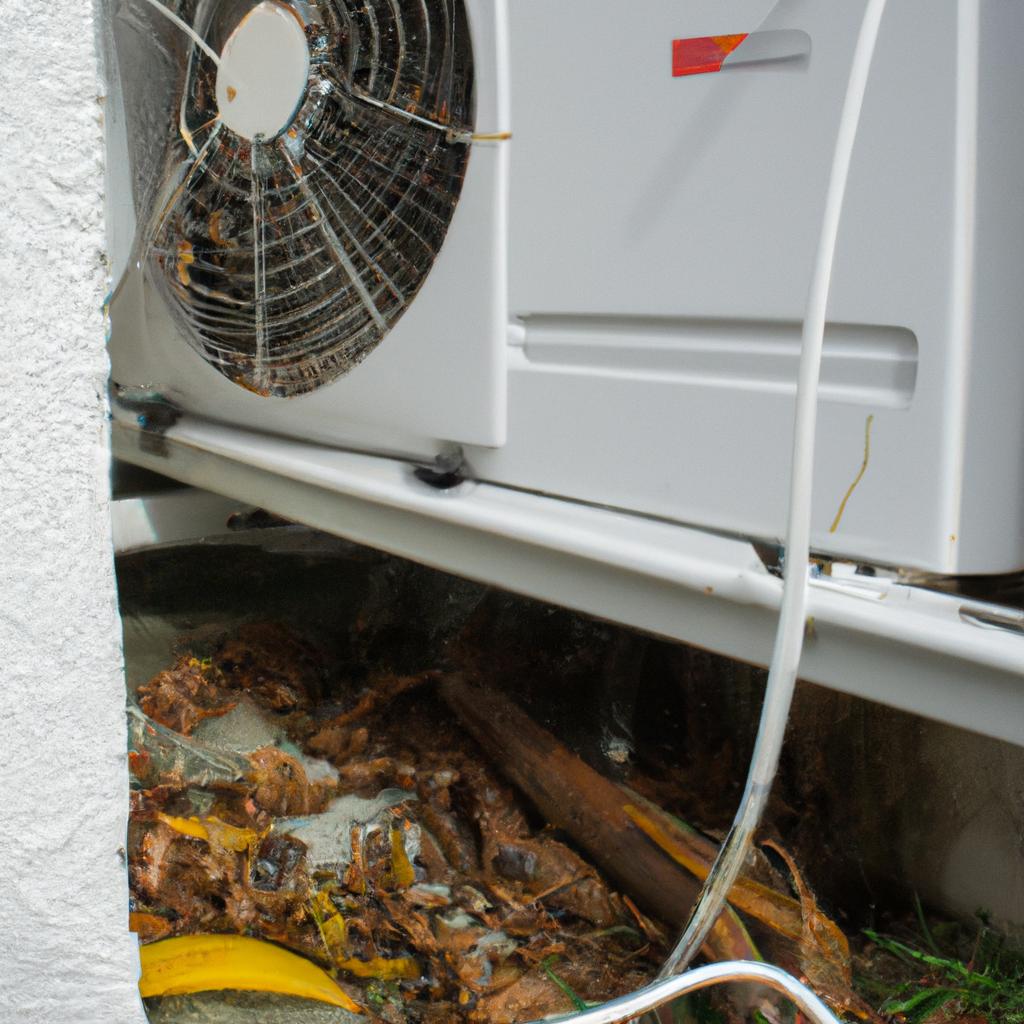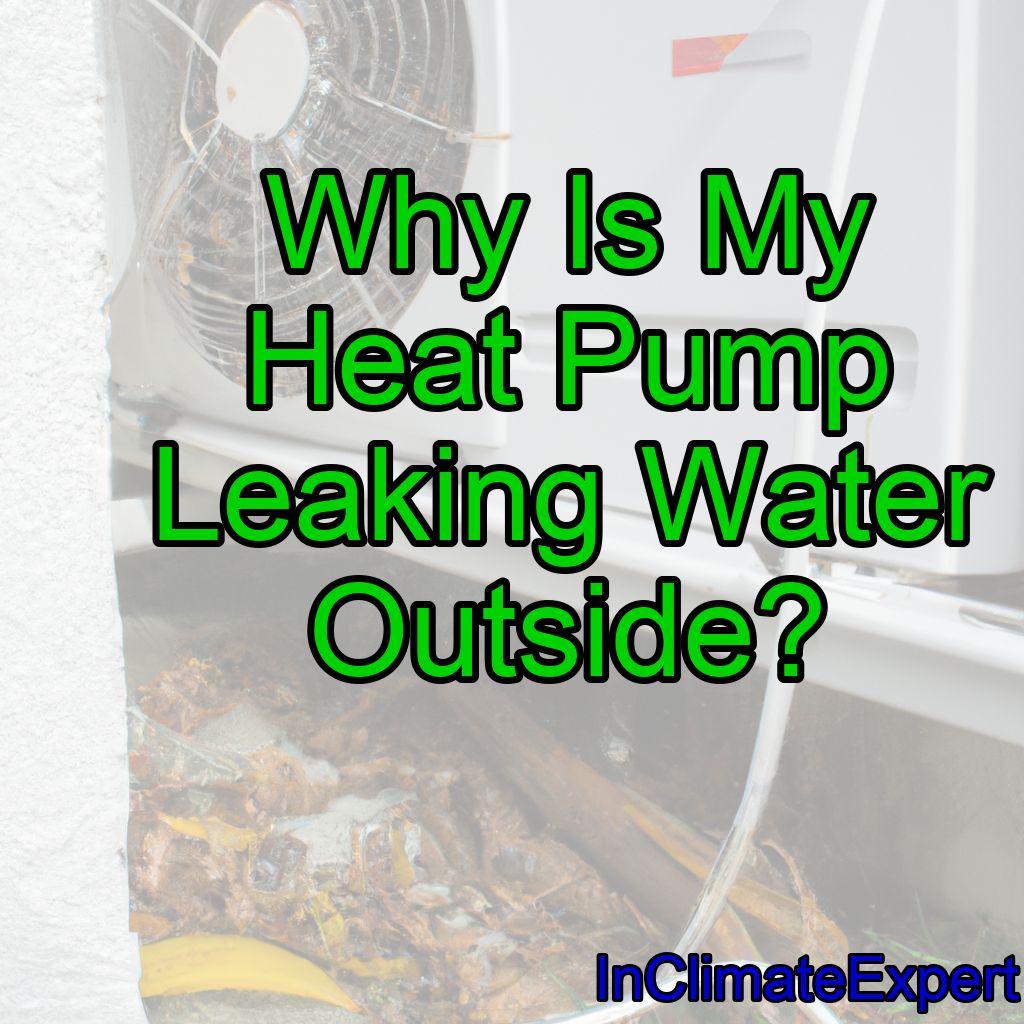If you notice water pooling around your heat pump unit outside, it might be a cause for concern.
Your heat pump may be leaking water outside due to a few possible reasons:
1. Condensation: During normal operation, heat pumps produce condensation, which is usually drained away. If the drain line is clogged or damaged, water may leak outside.
2. Frozen coils: In cold weather, ice can build up on the outdoor unit’s coils, causing water to leak when it melts. This could be due to low refrigerant levels, a malfunctioning defrost cycle, or poor airflow.
3. Dirty air filter: A clogged air filter can restrict airflow, leading to ice formation on the coils and subsequent water leakage.
4. Refrigerant leak: Low refrigerant levels can cause the coils to freeze and leak water when they defrost. A refrigerant leak requires professional attention.
To address the issue, start by checking and replacing the air filter if needed. If the problem persists, consult a professional HVAC technician to inspect the system, identify the cause, and perform the necessary repairs.
Heat pumps are designed to transfer heat from one place to another, but they should never leak water.

If you’re wondering why your heat pump is leaking water outside, there could be several reasons behind this issue. One of the most common reasons for a heat pump leaking water outside is a clogged drain line.
When this happens, the condensation that builds up inside the unit has nowhere to go and begins to overflow onto the ground.
Other reasons for a leaky heat pump could include damaged or disconnected drain pipes, low refrigerant levels or even a frozen outdoor coil.
In this article, we’ll take a closer look at these issues and provide some tips on how to troubleshoot and fix them.
Potential Causes
If you notice that your heat pump is leaking water outside, there are several potential causes that could be the culprit.
One possible reason is a clogged condensate drain line.
Over time, dirt and debris can accumulate in the drain line, causing it to become blocked and resulting in water backup.
Another possible cause could be a broken or damaged condensate pump.
This pump is responsible for pumping the water out of the heat pump and into a drainage system.
If it malfunctions or breaks down, water can leak outside.
Another possible reason for water leakage could be a frozen evaporator coil. When the coil freezes over, it can cause excess moisture to build up and leak outside.
Additionally, if your heat pump is not installed properly or has been damaged by severe weather conditions, it may also result in water leakage.
It’s important to address any of these issues promptly to prevent further damage and costly repairs.
To troubleshoot your heat pump and determine the exact cause of the issue, there are several tips you can follow.
Troubleshooting Tips
While there can be many potential causes for a heat pump leaking water outside, there are some common culprits to consider.
One possibility is that the condensate drain line is clogged or obstructed, causing water to overflow and leak outside.
Another potential cause may be a frozen evaporator coil, which can lead to excess moisture buildup and subsequent leaking.
If you suspect that your heat pump is leaking water outside, there are some troubleshooting tips you can try before calling in a professional for repairs.
First, make sure that the outdoor unit is level and on a stable surface.
Additionally, check the air filters and replace them if they are dirty or clogged.
Finally, inspect the condensate drain line for any obstructions or blockages that may be causing the leak.
If these troubleshooting tips do not solve the issue, it may be time to seek out professional repairs for your heat pump.
A qualified technician can diagnose and fix any underlying problems causing the water leakage, ensuring that your system is running efficiently and effectively for years to come.
Professional Repairs
If your heat pump is leaking water outside, it’s best to call in a professional for repairs.
There are several reasons why a heat pump might be leaking, including issues with the condensate drain line, clogged air filters, or low refrigerant levels.
A professional technician can diagnose the issue and make the necessary repairs. Attempting to fix the problem yourself can lead to further damage or even injury.
It’s always better to be safe than sorry when dealing with heating and cooling systems.
By calling in a professional, you can ensure that your heat pump is repaired correctly and safely.
Moving forward, once your heat pump has been repaired, it’s important to follow maintenance guidelines to prevent future leaks from occurring.
Regularly changing air filters and scheduling routine maintenance checks with a professional can help keep your system running smoothly and prevent costly repairs down the line.
Maintenance Guidelines
Now that you have identified that your heat pump is leaking water outside, it’s important to understand the maintenance guidelines.
Regular maintenance of your heat pump ensures its longevity and efficiency.
Here are some guidelines to follow.
Firstly, ensure that the condensate drain line is clear of any debris or blockages.
This can cause water to back up and leak outside.
Secondly, check the air filter regularly and replace it if necessary.
A clogged filter can restrict airflow, causing your unit to work harder than necessary, which can result in excess condensation.
Remember to schedule a professional maintenance check-up at least once a year for optimal performance.
By following these guidelines, you can prevent future leaks and ensure that your heat pump runs smoothly all year round.
Conclusion
In conclusion, discovering water outside your heat pump can be concerning. However, there are several potential causes that range from minor issues to more significant problems.
By troubleshooting and performing regular maintenance, you can prevent costly repairs and ensure your heat pump is operating efficiently.
If you notice water around your heat pump, start by checking the condensate drain line and removing any blockages. Additionally, check the refrigerant lines for damage or leaks.
If these troubleshooting tips do not resolve the issue, it may be time to call a professional HVAC technician to inspect and repair your system.
Finally, maintaining your heat pump is crucial in preventing leaks and ensuring optimal performance. Regularly changing air filters, cleaning coils, and scheduling routine maintenance appointments will help keep your unit running smoothly.
With proper care and attention, you can enjoy a reliable and efficient heating and cooling system for years to come.




